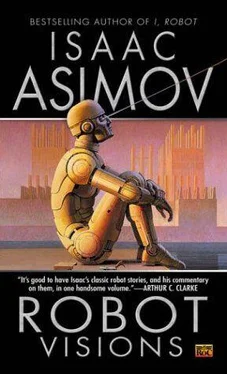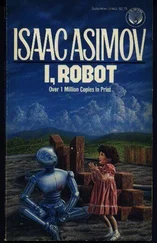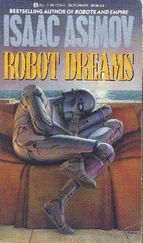Isaac Asimov - Robot Visions
Здесь есть возможность читать онлайн «Isaac Asimov - Robot Visions» весь текст электронной книги совершенно бесплатно (целиком полную версию без сокращений). В некоторых случаях можно слушать аудио, скачать через торрент в формате fb2 и присутствует краткое содержание. Жанр: Фантастика и фэнтези, на английском языке. Описание произведения, (предисловие) а так же отзывы посетителей доступны на портале библиотеки ЛибКат.
- Название:Robot Visions
- Автор:
- Жанр:
- Год:неизвестен
- ISBN:нет данных
- Рейтинг книги:5 / 5. Голосов: 1
-
Избранное:Добавить в избранное
- Отзывы:
-
Ваша оценка:
- 100
- 1
- 2
- 3
- 4
- 5
Robot Visions: краткое содержание, описание и аннотация
Предлагаем к чтению аннотацию, описание, краткое содержание или предисловие (зависит от того, что написал сам автор книги «Robot Visions»). Если вы не нашли необходимую информацию о книге — напишите в комментариях, мы постараемся отыскать её.
Robot Visions — читать онлайн бесплатно полную книгу (весь текст) целиком
Ниже представлен текст книги, разбитый по страницам. Система сохранения места последней прочитанной страницы, позволяет с удобством читать онлайн бесплатно книгу «Robot Visions», без необходимости каждый раз заново искать на чём Вы остановились. Поставьте закладку, и сможете в любой момент перейти на страницу, на которой закончили чтение.
Интервал:
Закладка:
“I am a-” Andrew began.
“Free robot. Yes, yes. All right, what did you want in the library?”
“I want to know more about human beings, about the world, about everything. And about robots, George. I want to write a history about robots.”
George put his arm on the other’s shoulder. “Well, let’s walk home. But pick up your clothes first. Andrew, there are a million books on robotics and all of them include histories of the science. The world is growing saturated not only with robots but with information about robots.”
Andrew shook his head, a human gesture he had lately begun to adopt. “Not a history of robotics, George. A history of robots, by a robot. I want to explain how robots feel about what has happened since the first ones were allowed to work and live on Earth.”
George’s eyebrows lifted, but he said nothing in direct response.
Little Miss was just past her eighty-third birthday, but there was nothing about her that was lacking in either energy or determination. She gestured with her cane oftener than she propped herself up with it.
She listened to the story in a fury of indignation. “George, that’s horrible. Who were those young ruffians?”
“I don’t know. What difference does it make? In the end they did not do any damage.”
“They might have. You’re a lawyer, George; and if you’re well off, it’s entirely due to the talents of Andrew. It was the money he earned that is the foundation of everything we have. He provides the continuity for this family, and I will not have him treated as a wind-up toy.”
“What would you have me do, Mother?” George asked.
“I said you’re a lawyer. Don’t you listen? You set up a test case somehow, and you force the regional courts to declare for robot rights and get the legislature to pass the necessary bills. Carry the whole thing to the World Court, if you have to. I’ll be watching, George, and I’ll tolerate no shirking.”
She was serious, so what began as a way of soothing the fearsome old lady became an involved matter with enough legal entanglement to make it interesting. As senior partner of Feingold and Martin, George plotted strategy. But he left the actual work to his junior partners, with much of it a matter for his son, Paul, who was also a member of the firm and who reported dutifully nearly every day to his grandmother. She, in turn, discussed the case every day with Andrew.
Andrew was deeply involved. His work on his book on robots was delayed again, as he pored over the legal arguments and even, at times, made very diffident suggestions.
“George told me that day I was attacked that human beings have always been afraid of robots,” he said one day. “As long as they are, the courts and the legislatures are not likely to work hard on behalf of robots. Should not something be done about public opinion?”
So while Paul stayed in court, George took to the public platform. It gave him the advantage of being informal, and he even went so far sometimes as to wear the new, loose style of clothing which he called drapery.
Paul chided him, “Just don’t trip over it on stage, Dad.”
George replied, despondently, “I’ll try not to.”
He addressed the annual convention of holo-news editors on one occasion and said, in part: “If, by virtue of the Second Law, we can demand of any robot unlimited obedience in all respects not involving harm to a human being, then any human being, any human being, has a fearsome power over any robot, any robot. In particular, since Second Law supersedes Third Law; any human being can use the law of obedience to overcome the law of self-protection. He can order any robot to damage itself or even to destroy itself for any reason, or for no reason.
“Is this just? Would we treat an animal so? Even an inanimate object which had given us good service has a claim on our consideration. And a robot is not insensitive; it is not an animal. It can think well enough so that it can talk to us, reason with us, joke with us. Can we treat them as friends, can we work together with them, and not give them some of the fruits of that friendship, some of the benefits of co-working?
“If a man has the right to give a robot any order that does not involve harm to a human being, he should have the decency never to give a robot any order that involves harm to a robot, unless human safety absolutely requires it. With great power goes great responsibility, and if the robots have Three Laws to protect men, is it too much to ask that men have a law or two to protect robots?”
Andrew was right. It was the battle over public opinion that held the key to courts and legislature. In the end, a law was passed that set up conditions under which robot-harming orders were forbidden. It was endlessly qualified and the punishments for violating the law were totally inadequate, but the principle was established. The final passage by the World Legislature came through on the day of Little Miss’ death.
That was no coincidence. Little Miss held on to life desperately during the last debate and let go only when word of victory arrived. Her last smile was for Andrew. Her last words were, “You have been good to us, Andrew.” She died with her hand holding his, while her son and his wife and children remained at a respectful distance from both.
Andrew waited patiently when the receptionist-robot disappeared into the inner office. The receptionist might have used the holographic chatterbox, but un-questionably it was perturbed by having to deal with another robot rather than with a human being.
Andrew passed the time revolving the matter his mind: Could “unroboted” be used as an analog of “unmanned,” or had unmanned become a metaphoric term sufficiently divorced from its original literal meaning to be applied to robots-or to women for that matter? Such problems frequently arose as he worked on his book on robots. The trick of thinking out sentences to express all complexities had undoubtedly increased his vocabulary.
Occasionally, someone came into the room to stare at him and he did not try to avoid the glance. He looked at each calmly, and each in turn looked away.
Paul Martin finally emerged. He looked surprised, or he would have if Andrew could have made out his expression with certainty. Paul had taken to wearing the heavy makeup that fashion was dictating for bath sexes. Though it made sharper and firmer the somewhat bland lines of Paul’s face, Andrew disapproved. He found that disapproving of human beings, as long as he did not express it verbally, did not make him very uneasy. He could even write the disapproval. He was sure it had not always been so.
“Come in, Andrew. I’m sorry I made you wait, but there was something I had to finish. Come in, you had said you wanted to talk to me, but I didn’t know you meant here in town.”
“If you are busy, Paul, I am prepared to continue to wait.”
Paul glanced at the interplay of shifting shadows on the dial on the wall that served as timepieces and said, “I can make some time. Did you come alone?”
“I hired an automatobile.”
“Any trouble?” Paul asked, with more than a trace of anxiety.
“I wasn’t expecting any. My rights are protected.”
Paul looked all the more anxious for that. “Andrew, I’ve explained that the law is unenforceable, at least under most conditions. And if you insist on wearing clothes, you’ll run into trouble eventually; just like that first time.”
“And only tine, Paul. I’m sorry you are displeased”
“Well, look at it this way: you are virtually a living legend, Andrew, and you are too valuable in many different ways for you to have any right to take chances with yourself. By the way, how’s the book coming?”
Читать дальшеИнтервал:
Закладка:
Похожие книги на «Robot Visions»
Представляем Вашему вниманию похожие книги на «Robot Visions» списком для выбора. Мы отобрали схожую по названию и смыслу литературу в надежде предоставить читателям больше вариантов отыскать новые, интересные, ещё непрочитанные произведения.
Обсуждение, отзывы о книге «Robot Visions» и просто собственные мнения читателей. Оставьте ваши комментарии, напишите, что Вы думаете о произведении, его смысле или главных героях. Укажите что конкретно понравилось, а что нет, и почему Вы так считаете.








